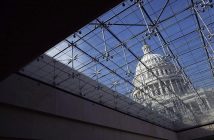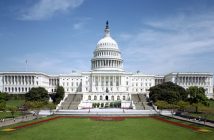On December 7, the House of Representatives unanimously passed legislation by voice vote to protect nationals of Hong Kong living in the United States. But it is much more than a noble effort to provide relief to people whose homeland is suffering under the repressive hand of the Chinese Communist Party (CCP).
The bill is H.R. 8428, the “Hong Kong People’s Freedom and Choice Act.” While well-intentioned, this bill is on shaky legal footing and significantly alters the process by which the federal government awards controversial Temporary Protected Status (TPS) to aliens currently in the United States.
It allows Hong Kong residents who are in the United States to apply for TPS protection provided that they meet three broad requirements: (1) that they were residents of Hong Kong and nationals of China at the time of their arrival in the U.S., (2) remained continuously in the U.S. after the passage of H.R. 8428, and (3) are otherwise admissible as immigrants.
Additionally, the bill moves the goalposts for which a Hong Kong resident can establish credible fear of persecution, setting a terrible precedent for future legislation and for the concept of credible fear itself. It does this through Section 9 of the bill by creating a “catch-all” category that goes well beyond existing asylum requirements.
Under current law, asylum applicants must demonstrate themselves that they face persecution because of their political beliefs or immutable characteristics. This bill endows the Secretary of State with the power to designate “aliens [who]share common characteristics that identify them as targets of persecution in the PRC on account of race, religion, nationality, membership in a particular social group, or political opinion” for purposes of establishing a well-founded fear of persecution.
In plain English, our Secretary of State could offer amnesty protections to any residents in Hong Kong who China might target. In a region as large as Hong Kong, that could apply to almost anyone.
If signed into law, it would be next to impossible for immigration adjudicators to deny refugee applications filed by residents currently in Hong Kong – come one, come all.
There is no question that China is aggressively infringing upon and unraveling the civil and political rights promised to Hong Kong under the One Country, Two Systems policy. The situation is unfortunate, and the United States pulls no punches in its attitude toward the CCP, whom we criticize regularly over its heavy-handed reaction to protests in Hong Kong.
That brings us to what the House passed on Monday. This bill, drafted by Rep. Tom Malinowski (D-N.J.) and co-sponsored by 17 other Democrats and six Republicans, aims to help residents of Hong Kong by allowing them to come here either through TPS protections or through this altered formal asylum process.
The bill – while good intentioned – is misguided for a number of reasons.
First, nothing about the situation in Hong Kong is temporary. Congress created TPS, foolish as the program is, to temporarily protect people in the country whose home countries had just experienced temporary but traumatic events, such as natural disasters or coup attempts. Compare this to what is happening in Hong Kong. The United Kingdom transferred control of Hong Kong to the CCP in 1997 with the guarantee that Hong Kong would remain autonomous internally, which included keeping its free-market economy and robust democratic institutions. China naturally sees this as a threat to its communist system and has made clear through its actions that it intends to unravel these democratic institutions as quickly as possible. Does this sound like a temporary bump in the road for Hong Kong’s democracy?
The answer, of course, is no – which renders TPS unfit for addressing this problem. China is clear that it wants to exert greater influence over Hong Kong’s internal affairs. Yet by encouraging all pro-democracy dissidents to leave Hong Kong and come to the U.S., we will give Beijing exactly what it wants and almost certainly doom the prospects of a well-organized pro-democracy movement in Hong Kong. Remember, the U.S. tried this approach with communist Cuba, and the results were predictably disastrous. The only people that threatened Fidel Castro’s oppressive government were in the United States – giving Castro free reign over the island. Since then, there has been little successful domestic opposition to the communist government there. Do we want to repeat those same mistakes with Hong Kong?
That brings us to the asylum provisions of the bill. There already exists a path for Hong Kong residents to seek asylum in the United States without legislative carve-outs. People fleeing political persecution can apply for asylum to the United States, and it is one of the standards by which asylum officers measure whether an applicant for asylum actually has a credible fear of persecution if they return to their country.
The United States often gives asylum protection to Chinese nationals, including Hong Kong residents. In FY 2019, nationals of China (including Hong Kong) made up 14.6 percent of all people who earned legal permanent residence through asylum. This was second only to Venezuela.
Clearly, there are already established mechanisms for fleeing political persecution in Hong Kong and coming to the United States. Changes to credible fear screenings for Hong Kong residents fearful of future persecution by Chinese officials erodes a long-held consensus on eligibility for asylum protection, and is unnecessary when this country already exhibits a willingness to protect dissidents from China and Hong Kong through our existing process.
There are better ways to help the people of Hong Kong outside of issuing visas through a new TPS designation and altering asylum standards. Taking in all of Hong Kong’s pro-democracy leaders and advocates would give Xi Jinping exactly what he wants – a compliant and docile Hong Kong. The only thing preserving democracy and open markets in Hong Kong are the brave people who make up their pro-democracy movement. Taking them out of Hong Kong – while Hong Kong still has an opportunity to fight against China’s overreach – would doom the autonomous region.
This bi-partisan attempt by the lower chamber to circumvent our existing asylum process by conjuring up a separate TPS entity and altering the credible fear requirement for Hong Kong residents is misguided. Our asylum process exists for a reason, and it clearly works if Chinese nationals made up the second-highest number of people earning asylum from our government in FY 2019. H.R. 8428 is well-intentioned yet bad policy for combating the continuing situation in Hong Kong and should be immediately shelved by the Republican-controlled Senate.





1 Comment
Pingback: Home Rams By Harmful Hong Kong Amnesty Invoice - Wanderlive.in